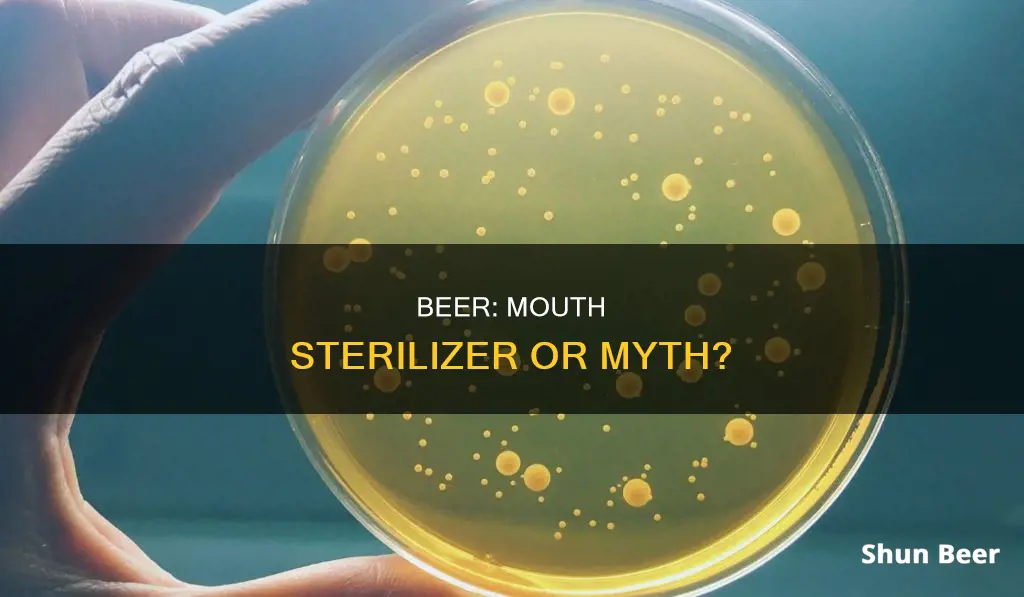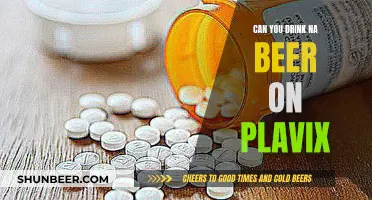
Alcohol is a well-known disinfectant, and some believe it can be used to treat gut infections. A 1988 study found that beer had an antibacterial effect on infectious gut bacteria such as salmonella, shigella, and E.coli. However, the alcohol content in beer is too low to sufficiently sanitise or disinfect. While beer may have some antibacterial properties, it is unlikely to sterilise your mouth.
| Characteristics | Values |
|---|---|
| Does drinking beer sterilize your mouth? | No |
| Is alcohol good for oral health? | No |
| Does alcohol kill bacteria in the mouth? | Yes |
| Does alcohol have a drying effect in the mouth? | Yes |
| Are alcoholic drinks high in sugar? | Yes |
| Are dark drinks like beer likely to cause more tooth discoloration? | Yes |
| Does alcohol cause structural damage to teeth? | Yes |
| Does alcohol destroy good bacteria in the mouth? | Yes |
What You'll Learn

Alcohol's effect on saliva
Alcohol has a significant impact on saliva, which plays a crucial role in maintaining oral health. Firstly, ethanol, the type of alcohol we drink, diffuses rapidly into saliva during consumption. Within 30 minutes, the ethanol concentration in saliva equilibrates with the blood, indicating its easy penetration throughout the body, including the oral cavity and salivary glands. This penetration has both immediate and long-term effects on oral health.
One of the immediate effects is the increase in acetaldehyde levels in the saliva, which has been linked to an increased risk of oral cancer. Acetaldehyde is a compound found in alcoholic beverages, and its concentration can be further elevated by microbial oxidation of ethanol by oral bacteria. Rinsing the mouth with an alcoholic beverage for 30 seconds can lead to a significant increase in salivary acetaldehyde levels, with the highest concentration typically observed within the first two minutes. This elevated acetaldehyde can cause DNA damage and is considered "carcinogenic to humans" by the International Agency for Research on Cancer (IARC).
Additionally, alcohol abuse can affect the structure and function of the oral cavity mucosa, salivary glands, and saliva. This disruption to the oral defense system impairs the protection of oral tissues and the upper digestive and respiratory tracts against microbial pathogens. Furthermore, chronic alcohol abuse can lead to atrophy of the parotid glands and reduced saliva flow, further contributing to local acetaldehyde accumulation and oral health issues.
Moreover, alcohol has a drying effect in the mouth, reducing saliva production. Saliva helps protect teeth from decay, so decreased saliva levels can negatively impact oral health. Alcoholic beverages also tend to be high in sugars, which can damage teeth, and sweet wines and mixed drinks with sodas or citrus juices contribute to tooth enamel erosion due to their high acidity.
In summary, while alcohol can kill some bacteria in the mouth, especially when swished around for a longer period, it has more detrimental effects on saliva and oral health overall. These effects include increased levels of carcinogenic compounds, disruption of the oral defense system, reduced saliva production, and direct damage to oral tissues. Therefore, it is not advisable to use alcohol as a regular disinfectant for oral or gut health.
Beer and Flu Medication: A Safe Mix?
You may want to see also

Alcohol's effect on tooth discolouration
Alcohol is known to have a detrimental effect on oral health. It dries out the mouth, reducing saliva production, which is essential for washing away plaque and bacteria. Alcohol also contains sugar and
The chromogens in alcoholic drinks can also lead to discolouration of the teeth. The acid in alcohol compromises the tooth enamel, allowing chromogens to attach to the surface of the teeth and cause discolouration. This is particularly true of drinks with a deep hue, such as red wine and sangria, but also darker beers. Beer contains barley and malts, which can turn teeth a dull grey over time. Lighter beers are less likely to cause discolouration.
To reduce the risk of discolouration, it is recommended to drink alcoholic beverages through a straw, or to rinse the mouth with water between drinks. Brushing teeth after drinking alcohol can also help to prevent discolouration and tooth damage.
Beer and Heart Failure: What You Need to Know
You may want to see also

Alcohol's effect on enamel
Alcohol has a negative impact on tooth enamel. The acid in alcohol wears away the tooth enamel, and once the enamel has been compromised, it is easy for dark-coloured beverages like red wine and dark beers to cause dullness and stains. The acid from the citrus in alcoholic drinks also erodes tooth enamel, while the sugar feeds the bacteria that cause tooth decay.
Alcohol also dries out the mouth, which is bad for oral health. Saliva plays an important role in keeping teeth healthy by washing away plaque and bacteria throughout the day.
In addition, alcoholic drinks tend to be high in sugars that can damage teeth. The barley and malts used to brew darker beers can also turn teeth a dull grey over time.
Root Beer and Diabetes: Is It Safe to Drink?
You may want to see also

Alcohol's effect on good bacteria in the mouth
Alcohol can have a significant impact on the good bacteria in your mouth, and not in a good way.
Firstly, alcohol is a diuretic, which means it causes dehydration. Saliva is 99% water, and it plays a crucial role in oral health by coating your teeth in antimicrobial peptides and antibodies, protecting your gums and teeth from harmful bacteria. Alcohol's dehydrating effect can lead to a dry mouth, reducing saliva production and leaving your teeth and gums vulnerable to infection and disease.
Secondly, alcohol is a potent antibacterial agent. While it kills bad bacteria, it also destroys the good bacteria that help keep your mouth and body healthy. These good bacteria are part of the oral microbiome, a community of microbes that protect your mouth and the rest of your body from disease-causing bacteria. Alcohol can disrupt the balance of the oral microbiome, leading to an increased risk of oral and systemic diseases, including periodontal disease, heart disease, and even some cancers.
Research has shown that moderate to heavy drinkers have altered oral microbiome compositions compared to non-drinkers or occasional drinkers, with reduced levels of healthy bacteria.
So, while alcohol may kill some bacteria in your mouth, it's not a good idea to rely on it for oral health. Drinking alcohol can have negative consequences for your oral microbiome and overall health.
Amtrak's Beer Policy: Can You Drink While Riding?
You may want to see also

Alcohol's effect on the stomach
Alcohol can have a range of harmful effects on the stomach and the wider digestive system. Firstly, alcohol can increase the amount of acid in the stomach, which can irritate the stomach lining and cause inflammation, a condition known as gastritis. This can lead to painful stomach ulcers, which can be fatal if left untreated.
Alcohol can also cause acid reflux, where digestive juices rise up from the stomach into the oesophagus, causing an uncomfortable burning sensation known as heartburn. In addition, alcohol can impair the function of the muscles separating the oesophagus from the stomach, further contributing to heartburn.
The consumption of alcohol can also inhibit the absorption of nutrients in the small intestine, leading to malnutrition and weight loss. It can also increase the transport of toxins across the intestinal walls, which may contribute to alcohol-related damage to the liver and other organs.
Chronic alcohol abuse can lead to an overgrowth of bacteria in the small bowel, which is thought to be linked to gastrointestinal symptoms such as diarrhoea, nausea, and vomiting.
Finally, alcohol increases the risk of several cancers associated with the digestive system, including mouth cancer, oesophageal cancer, and bowel cancer.
Germans' Historic Preference for Beer Over Water
You may want to see also
Frequently asked questions
No, drinking beer does not sterilize your mouth. While alcohol is a well-known disinfectant, the alcohol content in beer is too low to sufficiently sanitize or disinfect your mouth. In fact, drinking beer can cause harm to your oral health by drying out your mouth and removing the protective layer of saliva that shields your teeth from corrosive substances.
Alcohol concentrations lower than 40% are significantly weaker in affecting bacterial growth. Alcohol with a 10% concentration has almost no effect. For alcohol hand rubs, a high alcohol concentration in the range of 60-80% is considered optimal for antimicrobial activity.
No, there are no known benefits of drinking beer for oral health. Beer tends to be high in sugars that can damage teeth and cause tooth discoloration. The acids in beer can also corrode tooth enamel, leading to tooth sensitivity and pain.







